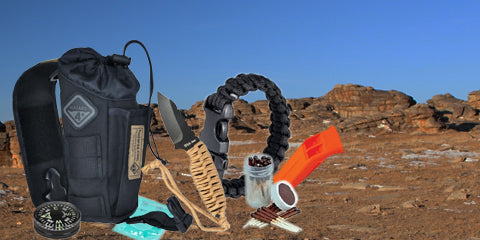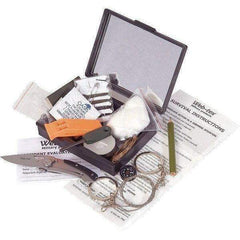
Prepping is simply about being aware of, and prepared for possible threats that could seriously challenge our way of life.
It is perfectly natural for a human to imagine an array of different possible threats, and then working out possible solutions about how we can survive, if any of those situations happened to materialise.
We have basic fundamental needs that need to be met just to survive, so in a crisis situation these would obviously take priority. For example, food, water, shelter and clothing to keep warm. These are the foundation needs that a prepper starts with, and then they can work upwards to prepare more layers to add for better survival.
Humans are more at risk of emergency situations arising than we may at first think. When most people think of preppers, they may picture a survival nut dressed in combat gear, armed to the teeth with weaponry, and appear to the outside world as a little bit strange.
But you can be a prepper no matter what your background and beliefs. Let me ask you a question. If your neighbourhood were to experience an unexpected earthquake or a freak severe snow storm that would cut you off from civilisation for a good few days, would you be able to cope?
Many sensible people will have a basic disaster pack, especially those with households built on fault lines or in climates that regularly experience extreme weather conditions. It is just common sense to be prepared with supplies for family members that should last between 3 and 5 days when you live with the possible risk of being cut off and isolated for this long. So there are more basic preppers in the world than you may actually realise.
However, there are many preppers who take their preparedness to even higher levels, and will have back-ups for their back-up plans, just in case the emergency situation lasts for longer than a few day.
How to get started
First of all, you should ensure you have basic provisions in place to cover not only your needs, but also any family members that live in your house. There are great forums online where other preppers offer advice and experiences that will help you to think of things that may not be obvious to you at first. If you have prepared to live without power for example, you don't want to be in a situation where you have a camping stove and plenty of candles, but no matches or a lighter available to get them started! A bit of an obvious point to make, yes, but you will be surprised at how easy it is to miss the simplest of things when building your list of essentials.
When starting out it can seem a little overwhelming at first, but if you concentrate on the most basic of your survival needs first, once these are in place you will have a good foundation to build on.
So your priorities should always start with:
- Food
- Water
- Shelter
- Clothing
Let us take a closer look at what you should gather together first:
Food
Start by stockpiling tinned and dried packet food that do not need to be kept in the fridge or freezer, and that have a long shelf-life. Quite often it will be cheaper to buy in bulk from larger supermarkets when items come on special offer, or the supermarkets run special promotions.
Buy as much as you can comfortably afford, and try to find a different bargain to stock up on each week or month when you do your bulk supermarket shopping. Check expiration dates on dried and packet foods, and choose ones with a good one or two years date left on them. Tinned foods tend to have long use-by-dates on them.
If you choose tinned and packet food that you would normally use throughout the year, then you can get into the habit of rotating them in the home so that they will never go out of date, and you can constantly replenish your stockpile with new produce while you use up the older items. Try to think 'eat what you store and store what you eat'.
Mix it up a little by adding a few different tins and packets to add interest, and prevent you from becoming bored of eating the same meals over again. Yes, baked beans are a cheap and nutritious staple to have in your stockpile, but try not to plan to eat them every day!
Water
The rule of thumb is to have 1 gallon of water per person per day. Work out how much water you will need for yourself and your family members for one day, then multiply that figure by three. Water is essential to life, so having three days worth of water in store will go a long way to getting you through an average emergency situation.
Because you may not know how long your crisis may last, it would be wise to play it safe and double up on your water supply as and when possible. Remember to also pack such items as water purification tablets and a water filter jug in the event that you need to draw water from another source that could be contaminated. If you still have power, or you have a home generator, then keeping water in the freezer is another way to extend your fresh water supply.
Medicines and medical supplies
There may be a chance of injury in some crisis situations, so keeping an up to date first aid kit is an essential must-have in your preparedness kit. Also include extra bandages, painkillers and sterilising supplies in case you have to deal with a severe injury and medical assistance will be delayed. If any of your family members take medication on a regular basis, try to ensure that they never run out of their medications, and always have a good back-up supply close at hand that is easily accessible should an emergency occur.
Some useful supplies for people starting to prep

This survival tin is a cheap alternative to many of the expensive “ultimate” survival tins available. The Web-Tex Combat Survival Tin, contains everything basic you need to start surviving and is favoured by army cadets and campers when going on expeditions. With kits to catch food, make fires, signal and purify water.

The DD Camping Hammock will provide you with warmth and shelter if you ever need to bug out. Lightweight, easy to pack and set up, this could be the perfect addition to any bug out bag. It is space efficient and is enjoyed worldwide by campers of all skill levels.
Emergency Grab Bag 72 Hour Kit

This is a great starter bug out bag to have in the interim while you either save for a bigger one or start assembling one yourself. It is also great to keep after you assemble your main bug out bag as it can be useful if you only need to survive for a short period of time before you come back. It contains everything you need for an emergency evacuation or disaster situation.

This knife is perfect for survival as it is useful for the infinite survival uses of a knife and it also includes a fire steel, making it a useful space saver in any bug out bag. It could also save your life in a self-defence situation as an absolute last resort, “you-or-them” situation.

What Great British prepping kit wouldn’t contain a tool for making a nice cup of tea? This high quality kettle is lightweight and compact, making it the perfect addition to any bug out bag. You might be asking yourself why tea would possibly be important in a survival situation. Well, John Hudson one of the best survivalists in the world believes that psychology is one of the most important aspects of survival and that enjoying an everyday thing like a cup of tea can be great for morale.
Light My Fire Swedish Fire Steel

Fire can be an essential part of survival. Which is why a fire steel is an important part of any prepper’s bug out bag. This competitively priced example was developed for the Swedish Department of Defence and now has a built in emergency whistle, which could help you call for aid if necessary.
BCB Advanced Lifesave First Aid Kit

This medical kit could mean the difference between life and death for you, a family member or anyone in need of medical help and is therefore essential to any prepper’s bug out bag. Part of prepping is being ready when the worst happens after the worst happens.

If you’re considering stock piling as part of your prepping plan, water is not a bad place to start. Water is essential to survival and is often taken for granted in the western world, but if there is no water supply, you will be glad to have stockpiled these bags, which could be the difference between life and death.
Pure Hydration Aquapure Traveler

Again, water is vital for survival. So finding a clean and pure source of it is essential. This bottle will help you to cleanse and purify water, making it safe for human consumption. This is not only useful for prepping, but can be used for hiking and camping as well.

Paracord is famous for being one of the most useful survival tools in the world. Having literally 1000s of uses paracord wristbands are worn by Special Forces worldwide. Any prepper who knows his stuff will have tonnes of paracord lying about.

For anyone trying to save space in their bug out bag, this tiny compass is perfect for navigating. This small compass serves its purpose perfectly, while being space and weight efficient.

Leave a comment